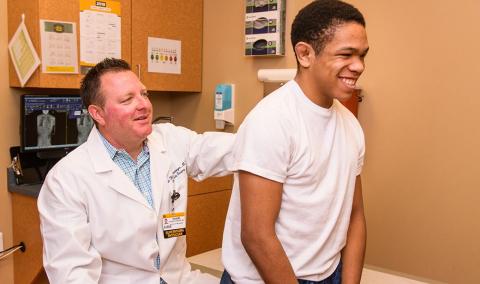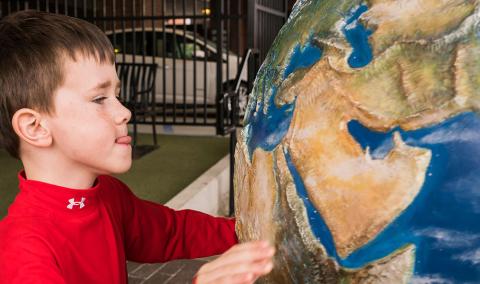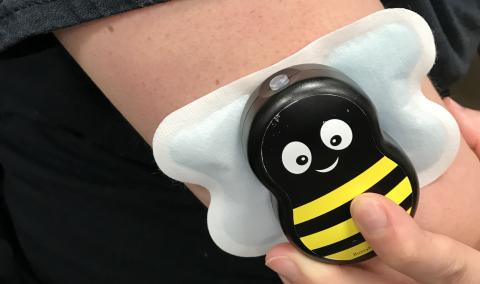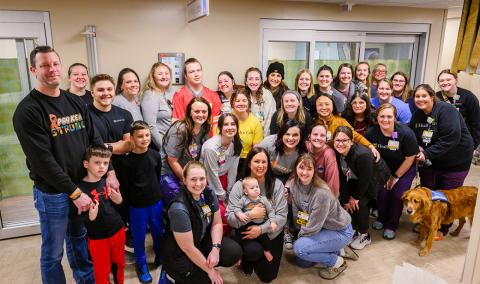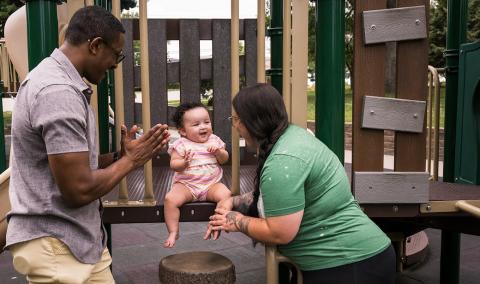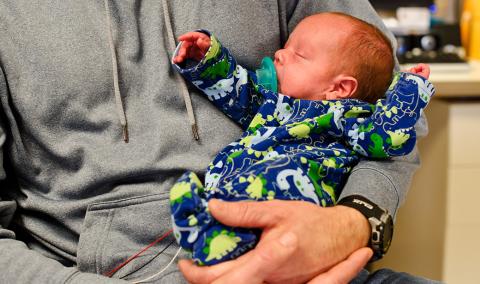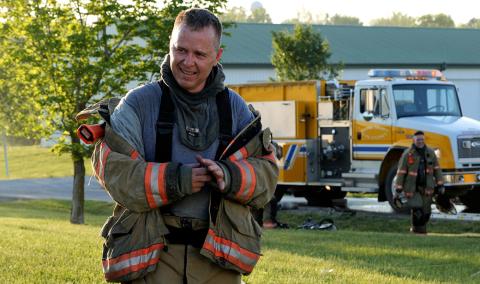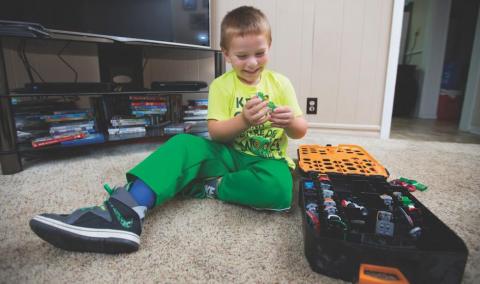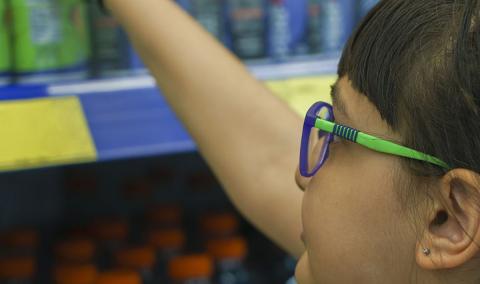When your child has skeletal dysplasia, we offer a team of support to ensure their long-term health and quality of life.
Skeletal dysplasia, or dwarfism, is a group of rare genetic bone conditions that affect your child’s growth, height and development. In many cases, our pediatric specialists can help your child grow stronger and live a fulfilling life with skeletal dysplasia.
Signs of Skeletal Dysplasia
Skeletal dysplasia affects how your baby’s bones and cartilage grow. Signs of skeletal dysplasia often show up in prenatal tests before your baby is born, or shortly after birth.
During a routine prenatal ultrasound, your care team may notice certain signs of dwarfism, such as:
- A curved spine
- A large head
- A small chest
- Short arms or legs
- Short fingers or toes
After your baby is born, signs of skeletal dysplasia include:
- A soft spot on their head that’s larger than usual
- Breathing problems
- Limited movement in arms or legs
If your care team suspects skeletal dysplasia, they may recommend more testing, such as:
- Amniocentesis or chorionic villus sampling (CVS)
- Additional imaging like fetal ultrasound or fetal MRI
- Genetic testing and counseling
A Care Team by Your Side
Receiving a diagnosis early can help you plan for your baby’s future.
When you learn that your baby may have dwarfism, you’ll have an expert team of providers at MU Health Care who will support you and help create a plan that works for your family’s specific needs.
Your care team may include:
Our team will help you understand your child’s diagnosis and recommend next steps.
Types of Skeletal Dysplasia
Skeletal dysplasia refers to more than 400 genetic conditions that affect your baby’s bones, joints and cartilage. Types of skeletal dysplasia that our team treats include, but are not limited to:
- Achondroplasia: Children with achondroplasia often have shortened limbs, an enlarged head, bowed legs, unstable joints and trouble straightening their elbows.
- Campomelic Dysplasia: Campomelic dysplasia is a rare, severe form of dwarfism that affects breathing, though treatments today have improved survival and care.
- Cartilage-Hair Hypoplasia: Cartilage-hair hypoplasia, also known as metaphyseal chondrodysplasia, McKusick type, is a rare bone disorder that also weakens the immune system and affects many parts of the body.
- Diastrophic Dysplasia: Diastrophic dysplasia affects bone and cartilage, often causing early joint pain (osteoarthritis) and difficulty with movement due to abnormal joint development.
- Ellis van Creveld Syndrome: Ellis van Creveld syndrome is a rare form of skeletal dysplasia that can cause a child to be born with extra fingers and toes, knock knee, dental issues and heart problems.
- Hypochondroplasia: Hypochondroplasia is a form of dwarfism that slows a child’s growth after age 3 and increases their risk of developing learning disabilities and seizures.
- Multiple Epiphyseal Dysplasia: Multiple epiphyseal dysplasia refers to a group of conditions with few signs and symptoms that cause issues with bone and cartilage development.
- Pseudoachondroplasia: Pseudoachondroplasia is a form of skeletal dysplasia that is not usually apparent at birth and can cause slowed growth and difficulty walking, starting between the ages of 2 and 4.
- Spondyloepiphyseal Dysplasia: Spondyloepiphyseal dysplasia has two types. Spondyloepiphyseal dysplasia congenita is a rare genetic condition that is present when a child is first born and affects their spine, hips, knees and eyes. Spondyloepiphyseal dysplasia tarda is a rare genetic condition that affects only boys, and symptoms do not become apparent until a child is 6 to 8 years old.
Skeletal Dysplasia Diagnosis at MU Health Care
Our pregnancy care team typically diagnoses skeletal dysplasia during pregnancy.
Diagnostic tests that we use to identify dwarfism include:
- Amniocentesis, which tests fluid from your uterus to identify whether your baby has a genetic condition
- Chorionic villus sampling (CVS), which tests tissue from your placenta to identify if your baby has a genetic condition
- Fetal MRI
- Genetic testing and counseling
- Ultrasound, which can detect signs of skeletal dysplasia after 22 weeks of pregnancy If your care team suspects that your baby may have dwarfism, they may refer you to our Fetal Intervention Center. Our fetal care specialists are experts in diagnosing and treating unborn babies who have genetic skeletal conditions.
How We Treat Skeletal Dysplasia
While there is no cure for skeletal dysplasia, our goal is to help your child live a fulfilling life. Your child’s care plan may focus on:
- Addressing physical challenges
- Improving quality of life
- Preventing complications
Ultimately, a child’s long-term health outlook depends on the type of dwarfism they have.
Your Child’s Care Team
Skeletal dysplasia can affect a child’s growth, digestive system, heart health, respiratory system and more.
That’s why we bring together a team of experts from different fields who work together to address your child’s needs. You child’s care team may include the following pediatric specialists:
- Audiologists
- Cardiologists
- Gastroenterologists
- Nephrologists
- Orthopedic surgeons
- Psychologists
- Pulmonologists
- Sleep medicine doctors
- Speech therapists
- And others
Together, they’ll develop a care plan tailored to your child’s current and long-term needs. They’ll personalize the care to meet your child’s:
- Lifestyle needs
- Physical needs
- Social and emotional well-being
- Medications
- Surgeries to correct bone problems, including limb-lengthening surgery and spinal fusion
Why Choose MU Health Care for Skeletal Dysplasia Care
National Leaders in Skeletal Dysplasia
MU Health Care providers lead and participate in skeletal dysplasia research. That means your child may have access to treatments and approaches not yet widely available.
Specialized Fetal Care
If your pregnancy care team suspects that your unborn baby has skeletal dysplasia, they may refer you to our Fetal Intervention Center. Our fetal care surgeons and maternal fetal medicine specialists are leaders in diagnosing and treating genetic conditions during pregnancy. They’ll provide you with the support you need and may even recommend treatment options for your baby before delivery.
Pediatric Specialists
If your child has dwarfism, you’ll have a team of pediatric specialists in your child’s corner. As the only Children’s Hospital and academic health system in the region, MU Health Care has doctors in 30 pediatric subspecialties. That means your child’s care team will have the advanced training and expertise needed to provide ongoing treatment for skeletal dysplasia. Together, they’ll monitor your child’s health and address any complications as soon as possible.
Related Conditions & Treatments
- Adolescent Medicine
- Aerodigestive Program
- Down Syndrome
- Emergency Care for Kids
- Feeding Tubes for Children
- Juvenile Diabetes
- Hyperbaric Oxygen Therapy
- Inpatient Pediatric Psychiatric Care
- Neonatology
- Pediatric Anesthesiology
- Pediatric Cancer
- Pediatric Cardiology
- Pectus Carinatum
- Pediatric Chest Wall Disorders Program
- Pediatric Dermatology
- Pediatric Development and Behavior
- Pediatric ENT (Ear, Nose and Throat)
- Pediatric Epilepsy
- Pectus Excavatum
- Pediatric Eye Care
- Pediatric Gastroenterology
- Pediatric Infectious Diseases
- Pediatric Inpatient Rehabilitation
- Pediatric Nephrology
- Pediatric Neurology
- Pediatric Neurosurgery
- Pediatric Orthopaedics
- Pediatric Plastic Surgery
- Pediatric Primary Care
- Pediatric Psychiatry
- Pediatric Pulmonary Medicine
- Pediatric Sleep Medicine
- Pediatric Surgery Services
- Pediatric Surgical Services
- Pediatric Urology
- Pediatric Vascular Anomalies
- Pediatric Weight Management
- Sickle Cell Disease




